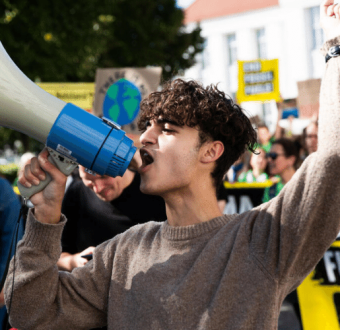Washington, DC — Today, Senator Bernie Sanders announced he would end his campaign for the Democratic presidential nomination in a video message to supporters. Sanders remains the only candidate to earn an A+ in Greenpeace’s 2020 climate ranking [1]. His campaign raised the bar on climate policy by committing to a detailed vision for moving beyond fossil fuels and embracing a just, renewable-powered economy through a Green New Deal.
Greenpeace USA Senior Climate Campaigner Jack Shapiro said:
“The bar for climate policy isn’t set by what political donors want or what pundits think is feasible, it’s set by science. Sanders understood that perhaps more than any candidate. His focus on phasing out fossil fuels and holding oil and gas CEOs accountable for their role in creating the climate crisis must become a baseline for the Democratic Party.
“Right now, those same oil and gas CEOs are viewing the COVID-19 pandemic as a massive opportunity for profit. Our government should be providing relief to working families, not a bailout to the architects of the climate crisis. We know Sanders will continue to fight in the Senate to prevent a single cent of taxpayer money from going to enrich fossil fuel CEOs and shareholders, and we hope to see others join him.
“As the presumptive nominee, Joe Biden must now take up the mantle and prove he has the commitment and vision to win over climate voters in November. There is no ‘middle of the road’ approach to the climate crisis — we must do all we can to protect the communities already facing climate disasters. Thanks to pressure from voters and activists, Biden has improved since debuting with a “D-” in Greenpeace’s original ranking. He would be wise to pick up where Sanders left off and fight to end the fossil fuel industry’s stranglehold on our democracy and economy.
Key elements of Sanders’ climate plan include [2]:
- The scope and ambition of his plan to phase out the oil, gas, and coal industries, including policies to end fossil fuel production on public lands, ban fossil fuel subsidies, reinstate the crude oil export ban, and make polluting corporations pay into a resilience and recovery fund for climate-impacted communities.
- His just transition plan, including investments that would create millions of family-sustaining, union jobs in a renewable energy economy and provide long-term security for fossil fuel workers with wage insurance, benefit guarantees, and job retraining.
- His vision for a Green New Deal, which includes a $16 trillion investment in advancing environmental justice, energy equity, and a clean energy future, and a plan to confront the fossil fuel executives who knowingly created the climate crisis.
Read more at the Greenpeace Climate 2020 scorecard: https://www.greenpeace.org/
ENDS
Notes:
[1] The interactive Greenpeace candidate scorecard is available here, a detailed breakdown by candidate is available here, and the scoring methodology is available here.
[2] A side-by-side breakdown of Sanders’ and Biden’s climate platforms is available here: https://www.greenpeace.org/
To maintain independence, Greenpeace USA does not endorse or oppose any political party, candidate, or elected official. We work to hold all candidates for office to the standard that science says is necessary to avert climate crisis, which means supporting a Green New Deal and ending fossil fuels.
Contact: Ryan Schleeter, Senior Communications Specialist, Greenpeace USA: +1 (415) 342-2386, [email protected]

